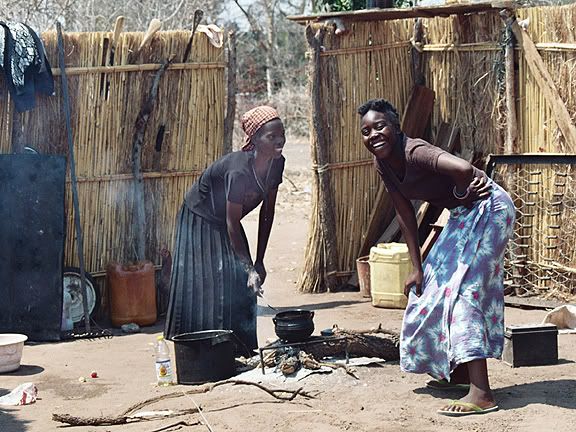
Taken while researching Heart of Diamonds
Tags: romantic thriller, Congo, blood diamonds
Dave Donelson's romantic thriller of scandal, love, and death in the Congo

Taken while researching Heart of Diamonds
Tags: romantic thriller, Congo, blood diamonds
The message of this month's Rally for Peace in Congo continues to reverberate.
STOP THE GENOCIDE & RAPING WOMEN IN CONGO
Dave Donelson, author of Heart of Diamonds a romantic thriller about blood diamonds in the Congo.
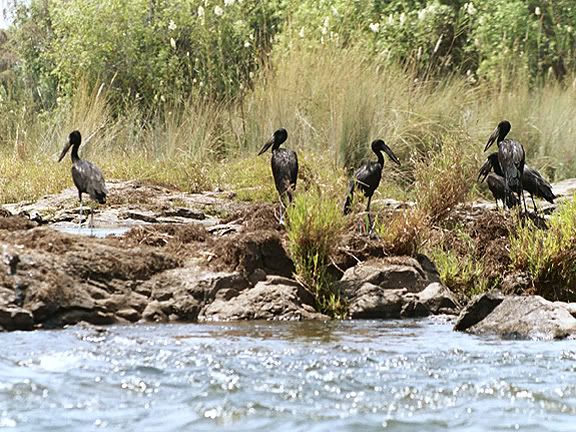
Taken while researching Heart of Diamonds
Tags: romantic thriller, Congo, blood diamonds
Photojournalist Misengabo Esperance Kapuadi memorialized the January 17 Rally for the Congo with some exciting images of concerned individuals crying out for peace. I am grateful for her permission to share them here.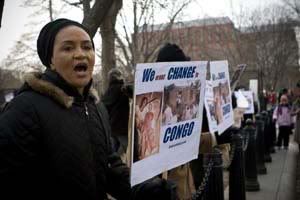
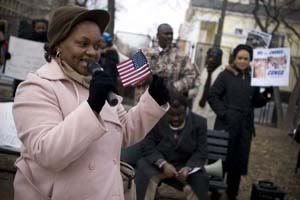

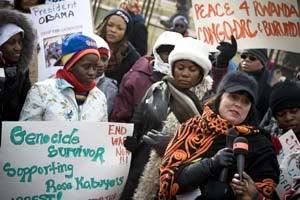
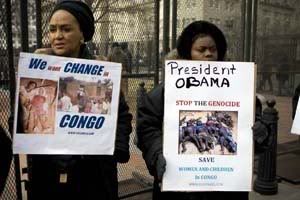
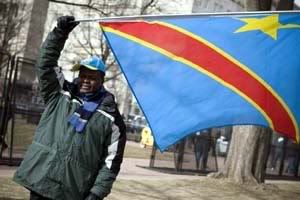
To see more of Misengabo's striking work, visit her at www.mekapuadi.com.
Dave Donelson, author of Heart of Diamonds a romantic thriller about blood diamonds in the Congo.
This guest post is from Nathaniel Houghton, a friend I made during Congo Week. Nate organized the Cornell University observance that week in Ithaca, NY, and invited me to speak. He told me at the time he was planning a trip to the DRC during his winter break and I asked him to keep me appraised of what he saw. I was delighted to receive this message about conditions outside the war zone:
My parents, not surprisingly, were the first to ask, “Why the heck are you going there?” when I informed them of my plans to travel to Kinshasa between semesters this year. My explanations of the leadership development program for high school students that I hoped to discuss were, for them, grossly inadequate. This scene – me forcing a smile while I watched the confusion build on their faces – was to repeat itself many times with many people in the buildup to my trip. Always, the follow- up question was, “Well… isn’t there a war there right now?”--My thanks to Nate for this enlightening contribution.
As most of you reading this blog regularly undoubtedly know, there is indeed a war in the Congo. The war in the east, though, has very little if any effect on life for the citizens of Kinshasa, which is far from the dangerous battlegrounds in the Kivu provinces. When the lack of transportation infrastructure in the Congo is considered, these miles become even longer. Psychologically, the citizens are similarly unaffected. When I asked whether the war had an impact on the daily life of Kinshasa, my host Patrick simply responded “Ils sont habitués.” Sadly, the residents of Kinshasa are so used to wars in their nation that they pay them little attention unless true danger is imminent.
This is not to say that there is no poverty and hunger in Kinshasa. There is, and it is impossible to miss. Truly, the city has fallen into a state of disrepair that will take years to amend, and I only hope that the work I am doing in Kinshasa’s schools makes a difference in this way. Nevertheless, there are enclaves of affluence. For instance, I visited a wealthy friend’s house and was served a wonderful meal after swimming in a pristine pool and watching a DVD in an air- conditioned living room. I might as well have been in Florida (see the picture).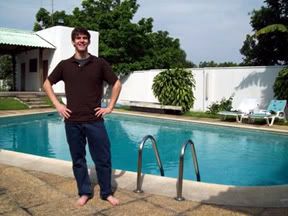
So, in many ways, my trip was a learning experience beyond what I expected. I was happy to at no point find myself in a state of danger, and the people I met were all accommodating and friendly. The Congolese certainly can have a bright future, if only we help them take steps to bring it about.
Rwandan troops crossed into the Democratic Republic of Congo (DRC) Tuesday, opening their joint campaign with the Congolese army to hunt down Rwandan Hutu rebels operating as the FDLR in North Kivu. The DRC says the Rwandan presence on Congolese soil is an observation mission, but about 2,000 Rwandan soldiers are believed to have made the crossing.
The invitation Congolese President Joseph Kabila issued to Rwanda represents a bizarre reversal of position. The two countries currently have no diplomatic relations and have spent several years accusing each other of fighting a proxy war in the Kivus. Rwanda was reported to be backing Laurent Nkunda and the CNDP, a Tutsi militia that nearly overran Goma in November. At one point, Nkunda declared his intention to march across the DRC and overthrow Kabila's government. He has apparently since been deposed by his own military commander, Bosco Ntaganda, who said he wants to bring the CNDP army into the fold of the FARDC, the Conglese army, and join in the action against the FDLR.
The joint operation excludes the UN, and considerable concern has been expressed by aid organizations that the fighting will exacerbate already dreadful conditions for the civilian population. A Reuters reporter north of Goma in the town of Kibati said Congolese army soldiers were stopping all vehicles, including U.N. peacekeepers, from going north.
Concern for civilians is well-placed, since a similar joint operation between the Ugandan army and the Congolese to track down Joseph Kony's Lords Resistance Army farther north in Orientale province has resulted in hundreds if not thousands of civilian deaths and put many thousand refugees out of their homes. Reports from Radio Okapi say that Kony's rebels set fire to a church full of worshipers a few days ago, burning them alive before attacking other communities in the towns of Tora and Libombi located about 130 km from Dungu, the military base of the joint Ugandan-Congolese operation. Before that incident, Human Rights Watch said over 600 civilians have been killed by the LRA.
Dave Donelson, author of Heart of Diamonds a romantic thriller about blood diamonds in the Congo.
My friend Patrick Tshilenge made this impassioned plea at the Rally for Congo Peace: Brothers and sisters of the Congolese diaspora and to all of you who are friends of The Congo. For many years we have seen different administrations moving in and out of Washington with no significant change to the situation in the Congo. We have seen how parallel events of lesser magnitude like the Kosovo war seemed to draw more attention and intervention then the situation in The Congo. We have seen hearings, reports, commissions, resolutions and many negotiations with absolutely no results. Instead we often see perpetrator and belligerents who have been cited as direct actors in the turmoil welcomed with open arms at the White House.
Brothers and sisters of the Congolese diaspora and to all of you who are friends of The Congo. For many years we have seen different administrations moving in and out of Washington with no significant change to the situation in the Congo. We have seen how parallel events of lesser magnitude like the Kosovo war seemed to draw more attention and intervention then the situation in The Congo. We have seen hearings, reports, commissions, resolutions and many negotiations with absolutely no results. Instead we often see perpetrator and belligerents who have been cited as direct actors in the turmoil welcomed with open arms at the White House.
As it is often said now days, IT’S TIME FOR CHANGE. The crimes that have been committed against the Congolese people are atrocious, the living conditions of the inhabitants of eastern Congo are deplorable and the humanitarian crisis is catastrophic. The numbers of casualties and other victims of this war are too big. They will be marked in history. Therefore we may ask ourselves these questions. what is the world awaiting to intervene? What more has to happen for this tragedy to be put to rest?
The 1.6 millions who have been displaced are not enoughHow come the 400,000 casualties in Darfur get more attention then 6 millions who have died in The Congo?
The hundreds of thousands of rapes and other human rights violations are not enough
The 6 millions who lost their lives are not enough

A spirit deeper than simple outrage over the continuing humanitarian crisis in the Democratic Republic of Congo pervaded the rally I attended yesterday, just three days before the inauguration of Barack Obama in Washington, DC. There were plenty of voices raised in protest of the terror rape, recruitment of child soldiers, and massacres of civilians that fill the headlines, but following those oft-heard verses was a chorus of something not often sung--one of hope for Congo.
In the rally in Lafayette Park and later during a conference held at Trinity College, demonstrators and speakers not only cried out for the end of the hostilities but expressed their belief in the future of Congo to achieve its potential as a vibrant, thriving state built not just on its mineral wealth but on the spirit and goodwill of its people. Is this the beginning of a movement?
The event was sponsored by Congo Global Action, Friends of the Congo, African Faith and Justice Network and the Congolese Community of United States of America, in collaboration with Eve Ensler's V-day and Jackson Films, The Greatest Silence: Rape In The Congo.
Over 300 demonstrators marched and chanted in the bitter cold, with leadership passing back and forth in easy comradeship. In addition to many Congolese and friends of the Congo from Washington, delegations came from Atlanta, Boston, and New York, as well as guests and speakers from all over the world from Paris to Osaka. Despite the nose-numbing cold, the crowd grew as the event continued--and once there and caught up in the spirit, no one left until the absolute end. 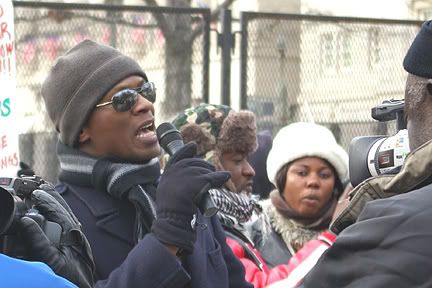
One of the most impassioned speakers for unity was the organizer of the NY delegation, Joseph Mbangu, who called for ethnic divisions and petty jealousies to be put aside for the greater good.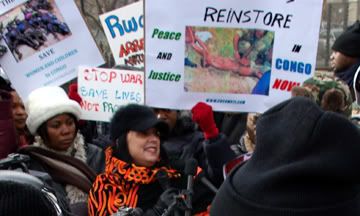
The keynote speaker in the afternoon was activist, playwright, and actress Eve Ensler, who decried the horrors of femicide, the use of gang rape and mutilation to terrorize the population and control conquered territories. The brutality tears apart the fabric of society, she said, and creates wounds that will last for generations.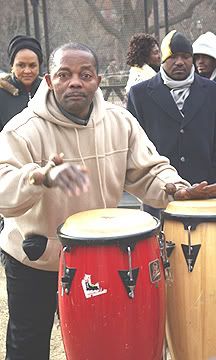 It was remarkable how many members of the diaspora knew each other. Friendship crossed generations and spanned years and thousands of miles of separation. Wrapping up the afternoon's activities was a rousing solo concert by Philadelphia drummer Bokulaka, who not only warmed up the crowd but brought the park rangers onto the scene. Their intrusion didn't damper the spirits of the group, however, and the rally continued peaceably until it was time to adjourn to Trinity College for the conference. I'll report on that event in later posts.
It was remarkable how many members of the diaspora knew each other. Friendship crossed generations and spanned years and thousands of miles of separation. Wrapping up the afternoon's activities was a rousing solo concert by Philadelphia drummer Bokulaka, who not only warmed up the crowd but brought the park rangers onto the scene. Their intrusion didn't damper the spirits of the group, however, and the rally continued peaceably until it was time to adjourn to Trinity College for the conference. I'll report on that event in later posts.
Dave Donelson, author of Heart of Diamonds a romantic thriller about blood diamonds in the Congo.
Two days after I wrote that Tutsi rebels under the command of General Bosco Ntaganda might be making a deal with Joseph Kabila's government, my speculation came to pass. According to Reuters, Ntaganda's faction of the CNDP announced their willingness to join Rwandan and DRC armed forces to battle the Hutu FDLR, remnants of the Hutu Interahamwe who fled to Congo following the Rwandan genocide of 1994.
Ntaganda's spokesman, Colonel Esaie Munyakazi, made the announcement in Goma while the Congolese interior minister and Rwanda's top armed forces commander looked on. He added that they were willing to fight alongside the FARDC "with a view to them being reintegrated into the national army."
The great unknown in this situation is where the erstwhile leader of the CNDP, Laurent Nkunda, fits into the puzzle. As of this writing, there has been no reaction from his camp.
About two weeks ago, Ntaganda announced that he and his officers had deposed Nkunda and were now in charge of the rebel army. Denials were issued and not much seemed to have changed, with even representatives of Kabila's government meeting with Nkunda's delegation to the UN-sponsored negotiations in Nairobi while the UN's chief negotiator, former Nigerian president Olusegun Obasanjo, met with Nkunda.
Shifting alliances are nothing new in the Democratic Republic of Congo, so it's not likely that Ntaganda's announcement is the end of the story.
Dave Donelson, author of Heart of Diamonds a romantic thriller about blood diamonds in the Congo.
I'll be joining many friends in Washington, DC, this weekend to show our support for the people of the Democratic Republic of Congo and to raise awareness among the members of the incoming administration.
The events include a rally (1 pm EST) and forum (6 pm EST) in Washington, DC. Featured participants include Eve Ensler of V-Day, who will participate in a Rally in front of the White House and Guy Patrice Lumumba, the youngest son of Patrice Lumumba, who will be a guest speaker at the Saturday forum.
Peace RallyCall 202-884-9775 or 202-884-9783 for more information.
Time: 1:00 - 5:00 PM
Location:
Lafayette Park
In front of White House
16th & H Streets
Washington, DC
Saturday Congo ForumCall 202-584-6512, 202-884-9783 or 720-447-4946 for more information.
Time: 6:00 - 9:00 PM
Location:
Trinity College
125 Michigan Avenue, NE
Washington, DC 20017
With all the war news, we forget that over 90% of the DRC lives in relative peace right now. This video clip about the Kinshasa Symphony Orchestra shows how much beauty exists in the Congo.
Dave Donelson, author of Heart of Diamonds a romantic thriller about blood diamonds in the Congo.
Radio host and suburban media maven Hezi Aris recently invited me to appear on his WVOX-AM program, "On The Level With Hezi Aria" to discuss events in the Congo and Heart of Diamonds. An mp3 version of the program is available for download at Hezi's NY Times-recognized blog, Yonkers Tribune.
Dave Donelson, author of Heart of Diamonds a romantic thriller about blood diamonds in the Congo.
Last night in Manhattan I talked to the Ambassador to the UN from the Democratic Republic of Congo, Ileka Atoki, as I gave him a copy of Heart of Diamonds. We met at a screening of Lisa Jackson's documentary, "The Greatest Silence: Rape In The Congo." Ambassador Ileka shed some interesting light on how the tactic of gang rape became so widely used in the DRC. He also spoke about what needs to be done to eradicate it. I couldn't agree with him more.
Rape as a weapon of war is nothing new, of course, nor was it invented in the Congo. According to Ileka, the current Congo rape epidemic began in earnest in 1998 when the armies of Uganda and Rwanda (among others) invaded the DRC ostensibly to destroy groups seeking to overthrow their governments which had taken refuge in Congo. Their rebel quarry, including the Hutu Interahamwe responsible for Rwanda's 1994 genocide, used gang rape as part of their arsenal of terror. The horrible tactic was soon adopted by the Congolese armed forces, who were (and are still) mostly uneducated, underpaid, ill-motivated youths, as well as their allies, the Mai-Mai militia, whose leaders encourage the superstition that raping a woman makes them fiercer warriors.
Lisa Jackson's film, which first aired on America's HBO last spring and is now being distributed around the world (see my previous posts about it), is a raw portrayal of the epidemic of violence against women that is destroying the fabric of life in Congo. I've seen it several times and the impact grows with each viewing. Lisa interviews rape victims, the people who struggle to care for them, and even several young men who committed the crime. Their cold-blooded accounts are the stuff of nightmares.
According to some estimates, a woman is gang-raped in Congo every eight minutes today.
Ambassador Ileka said that a recent DRC government study shows that many of the crimes are now being committed not only by the various armies and militias vying for control of the eastern provinces, but by civilians--men who were demobilized after the war officially ended in 2003. They view rape as their right.
He also pointed out that an entire generation of young men, boys when the war began, have grown up with violence against women all around them. It is part of the fabric of their lives. With eighty percent of all children in this generation denied an education by the war in Congo and a million refugees still homeless while the fighting continues, there is no social infrastructure to teach them it is wrong.
There is no easy solution and it may well take more than one generation to eradicate the plague. Awareness of the epidemic is growing, largely through the tireless efforts of Lisa Jackson and others like her. But true change, as Ileka said, will be possible only with an end to the fighting. Nothing substantive can be accomplished while more than twenty armed groups vie for control of Congo's riches. The current UN-sponsored peace talks and some very recent diplomatic and military maneuvers by the DRC government are the slimmest beginning of that process.
When the conflict finally ends, prosecution of perpetrators can help stop the practice. The DRC passed a clear stringent law criminalizing crimes of violence against women, but it is basically unenforceable under current conditions. Longer term, attitudes can be changed through education. Like many other repugnant beliefs that worm their way into the social fabric, though, the impunity with which rapists view their actions will not be eradicated overnight by either teachers or prosecutors.
Sadly, nothing will bring back the lost lives of the thousands of women and girls who have been brutalized.
Dave Donelson, author of Heart of Diamonds a romantic thriller about blood diamonds in the Congo.
I generally try to avoid speculation in this space, using it instead to report events in the Democratic Republic of Congo (DRC), especially as they relate to my novel, Heart of Diamonds. Today is different.
Things are changing in the DRC, and recent events lead me to make a few guesses as to what they mean and where they might lead. Despite the dire conditions in the eastern provinces (and elsewhere), I think there is a bright light at the end of the tunnel.
My guess is that the threat of final victory by the CNDP and the potential establishment of an independent nation in the Virungas prompted Joseph Kabila's government to take some drastic steps. Those steps have a good chance of paying off in the long term and perhaps even start the country on the path to peace.
First, Kabila agreed to negotiate directly with Laurent Nkunda under the auspices of the United Nations. This not only bought Kabila some time, but further committed the UN to an expanded peace-keeping role in the region. As ineffectual as it may be, MONUC's presence and the commitment of 3,000 additional troops (someday) can only reinforce Kabila's claim to legitimacy.
Second, Kabila invited Yoweri Museveni to send Ugandan forces into the DRC to join some Congolese regular army units (the FARDC) and troops from South Sudan in a hunt for Joseph Kony and the Lords Resistance Army. Kony has been thumbing his nose at Museveni from the Congo since he moved his rebel army from Uganda. Even if Operation Thunder Lightning, as it is called, is unsuccessful, my guess is that there will be a quid pro quo somewhere along the line. It could be Ugandan help in an attack on the CNDP sometime in the future, or at least a guarantee that Museveni won't provide support to Nkunda's rebels.
The third step was Kabila's surprise invitation to the Rwandan army to join Congolese forces in a campaign to eradicate the remnants of the Hutu Interahamwe, the FDLR, who have vowed to overthrow Paul Kagame's Tutsi-led government after having fled to the DRC following the genocide of 1994. General James Kabarebe, the Chief of Staff of the Rwandan army, was in Kinshasa last week to work on the joint plan. How does Kabila profit from having Rwanda troops on Congolese soil--an about-face from his long-held stance? It removes Nkunda's cause for rebellion, which has supposedly been to protect Congolese Tutsis from the FDLR.
These two alliances and the commitment of UN troops to support the peace effort also send a message to rogue commanders in the FARDC who have been setting up their own little fiefdoms in the Kivus: Come back into the fold or you could be next.
Kabila's latest move--and this is pure speculation on my part--was to persuade Bosco Ntaganda, Laurent Nkunda's second in command, to break away and split the CNDP into two factions. That situation is still murky and far from resolved (as I wrote recently), but it can only work in Kabila's favor. Whether a deal was made under the table with Ntaganda or he decided to bolt on his own after seeing the pressure build against Nkunda, his move gives Kabila a lot of room and strength in the negotiations.
What happens if all this plays out as I speculate? Peace in the eastern provinces may finally arrive and a million people may be able to return to their homes and rebuild their shattered lives. That peace might even stand a chance of enduring if the military alliances morph into a common economic market built on the rich resources in the region. If all the nations involved have opportunity to reap above-board profits from the mines and forests and farms of the Congo, they will be much more likely to keep the peace.
Dave Donelson, author of Heart of Diamonds a romantic thriller about blood diamonds in the Congo.
Will politics defeat the CNDP? A widening schism seems to have opened between Laurent Nkunda, titular head of the rebel militia that has kept the eastern provinces of the Democratic Republic of Congo in an uproar, and his second in command, Bosco Ntaganda. The ultimate outcome of the peace talks between the CNDP and the Congolese government hangs in the balance.
Ntaganda claims to have overthrown Nkunda, but the flamboyant general shows no signs of stepping aside, nor have there been any marked changes in his operation. Strangely, Nkunda says Ntaganda is still his chief of staff, although a meeting of top aides will be held "soon" to discuss his "dangerous decision" and Ntaganda "is no longer in a position to issue orders."
Both men still command significant numbers of troops in their respective strongholds. The CNDP army of 5,000 men controls large areas of North Kivu following an offensive last fall that carried them to the edges of Goma, the provincial capital. One large question now, of course, is who controls that army.
What remains to be seen is what will happen to the direct talks between the Kinshasa government and the rebels that are being held in Nairobi. Nkunda sent the current delegation to the talks and met personally with UN mediator and former Nigerian president Olusegun Obasanjo last week. Ntaganda calims he would pursue peace negotiations with Kinshasa himself, although he would back the delegation if it brought peace.
Both men have been indicted by the Congolese government for various war crimes. Ntaganda is also under indictment by the International Criminal Court for crimes against humanity that included recruitment of child soldiers and massacres of non-combatant civilians.
Dave Donelson, author of Heart of Diamonds a romantic thriller about blood diamonds in the Congo.

Taken while researching Heart of Diamonds
Tags: romantic thriller, Congo, blood diamonds
A leading voice against terror rape in the Democratic Republic of Congo, gynecologist Denis Mukwege, has been awarded the 2008 Olof Palme Prize for his work to help women victims of rape and war crimes. Last year, I wrote here about his moving testimony before the US Congress.
Dr. Mukwege's Panzi Hospital, located near Bukavu, the capitol of South Kivu province, was founded when he realized how many of his patients were seriously injured or contracted diseases after being raped. Today, the facility receives some ten women rape victims each day, with more than a quarter of the patients requiring surgery after their ordeal.
The prize committee said that Dr. Mukwege
"serves peace, understanding and solidarity in a way worthy of imitation through the work with the women who are the most exposed victims of this conflict."All sides of the ongoing conflict in the DRC have used gang-rape and mutilation of women as a weapon of terror. Forty-five women report being raped every day in South Kivu province alone, according to a report issued last year by the Scottish Catholic International Aid Fund. Estimates of non-reported rapes are triple that number.
Last month, Lisa Jackson's hard-hitting documentary, "The Greatest Silence: Rape In The Congo," ended a world tour with a special screening before the Congolese National Assembly in Kinshasa. Afterward, an audience of more than 600 politicians, diplomats, and dignitaries who viewed the film listened to rape survivor Marie Jeanne M'bsweshe plead with them to "get rid of the bandits" that make life hell for women in eastern Congo.
This extraordinary event took place in the National Assembly Hall in front of an audience that included Vital Kamerhe, President of the National Assembly, Kengo Wa Dondo, the President of the Senate, Deputy Prime Minister Nzanga Mobutu, the new Gender Minister, Marie Ange Lukiana Mufankolo and hundreds of other parliamentarians, ministers, dignitaries and members of the international community. The event was organized under the auspices the British Foreign and Commonwealth Office.
Madame M'Bweshe pointed to the machete scar on her forehead, to the teeth bashed out by her rapists, and described her husband's murder and her own torture and rape in gut-wrenching detail. National Assembly President Vital Kamerhe congratulated the woman for standing up and being so forceful and brave. He added,
"The title of this film 'The Greatest Silence' is quite evocative because I am sure that at the end of its screening the conscience of each of us will be touched and we will decide to stand together, particularly we men, in order to put an end to sexual violence against women. From this very moment, we ought to be able to say, 'Never again!'"The film, produced and directed by Lisa F. Jackson, won a Special Jury Prize at the 2008 Sundance Film Festival, was broadcast in the US on HBO in April and has been seen by audiences in over 50 countries. It inspired a UN Security Counsel resolution, opened a US Senate hearing, and has been screened in the British House of Commons, the International Criminal Court and the US Department of State.
The Lord's Resistance Army continues to reel from concentrated attacks by the joint military forces of the Democratic Republic of Congo (DRC), Uganda, and South Sudan. A group of 20 rebels surrendered to the Congolese army just three days after ten others were killed during a rebel assault on Megero airstrip in the northeastern DRC.
The three armies launched the offensive December 14. Code named, "Operation Lightning Thunder," it has scattered the rebels and sent them fleeing deeper into the jungles of Garamba and into neighboring Central African Republic, where they have raided villages in the past. The LRA is believed to consist of fewer than 1,000 fighters now, the remnants of a force trying to overthrow Uganda's government for over 20 years.
While the combined government operation has achieved notable success, destroying LRA bases with concentrated air and ground attacks, capturing two rebel commanders, James Onen and Peter Okot, and cutting supply lines to the remaining forces, LRA leader Jospeh Kony remains at large.
The rebels have also lashed out at civilians as they flee the government armies. They killed 20 people at a park ranger station in the town of Megero. In two other attacks Sunday, they raided a Protestant mission in Napopo and attacked Laso, a village in South Sudan. Over the Christmas holiday, rebels massacred about 100 civilians in the towns of Faradje and Tadu.
There were reports of brutal atrocities committed by the rebels in those attacks, unconfirmed but not unlike those for which Kony and two of his commanders have been indicted by the International Criminal Court.
If the combined operation can capture Kony or at least neutralize his militia, Joseph Kabila will have taken a major step toward stablizing the eastern provinces.
Dave Donelson, author of Heart of Diamonds a romantic thriller about blood diamonds in the Congo.
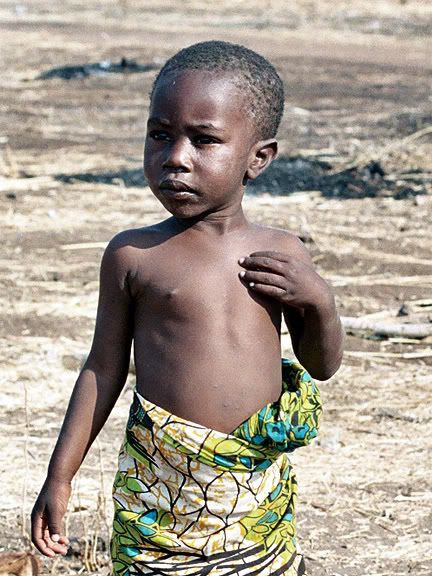
Taken while researching Heart of Diamonds
Tags: romantic thriller, Congo, blood diamonds
